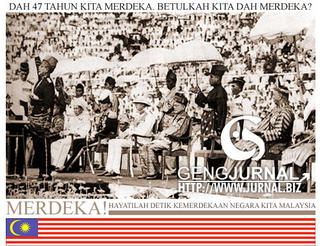Antigen : a foreign substance that triggers a reaction from the immune system. Often found on the surfaces of bacteria and viruses.
Humoral Immunity : a response of the host by producing antibodies that binds the introduced antigens and lead to their elimination. e.g; B lymphocyte.
Cell-Mediated Immunity : a response by the host which can rally cytotoxic T calls that can specifically react with and destroy the virus- infected cells when an antigen is unreachable by antibodies or avirus-infected cell. e.g; T lymphocyte.
Natural Killer Cell : a type of lethal lymphocyte which do not need to recognize a specific antigen before swinging into action. They target tumor cell and protect against infectious microbes.
T Cytotoxic Cell : a type of T lymphocyte cell which has receptors that are used to search each cell that it meets. If a cell is infected, it is swiftly killed. It also attacking cell infected by the virus, bacteria and cancer cells.
Active Immunity : occurs when an individual's own immune system is induced to produce a specific immune response against an antigens or pathogens. e.g ; upon infection or disease (Naturally Acquired Immunity) and vaccination (Artifically Acquired Immunity)
Passive Immunity : results when antibodies are produced by one individual then acquired by another. e.g ; an infant obtains colostrums secreted by the mammary glands after childbirth, (Naturally Acquired Immunity) and antiserum & antitoxin(Artificially Acquired Immunity)
Naturally Acquired Immunity : immunity acquired upon exposure to a specific pathogen particularly in the course of an infection/disease. e.g ; an infant obtains colostrums from mom.
Artificially Acquired Immunity : constitutes the various means by which humans enhance, via technology, the specific immunity of individuals. e.g ; vaccination, antiserum and antitoxin.
Immunological memory : capacities of immune system to keep characteristics of antigen and ability to distinguish microorganism for second invasion.
Tolerance : is a case of phenomenon where the immune system unable to recognize antigens. e.g. in transplant organ.
Role of Helper T Cell : the primary task is to activate B-cells and killer T-cells. Before that, the helper T cell must be activated. When a macrophage / dendritic cell has eaten an invader, they travels to the nearest lymph node to present information about the captured pathogen. The phagocyte displays an antigen fragment from the invader on its own surface, a process called 'antigen presentation'. When the receptor of a helper T cell recognizes the antigen, the helper T cell is activated. Once activated, helper T cells start to divide and to produce proteins that activate B and T cells as well as other immune cells (cytokines).
Innate Immunity : prevents entry of microorganisms into tissues or, once they have gained entry, eliminates them prior to the occurrence of disease. It characteristics ;
present from birth
non-specific-acts on many organisms and does not show specificity
does not become more efficient on subsequent exposure to same organism.
Acquired Immunity : occurs in response to infection called adaptive as the immune system must adapt itself to previously unseen molecules. Following recovery from certain infections with a particular microorganism , individuals will never again develop infection with the same organism, but can become infected with other microorganism , i.e. he/she is protected against one microorganism. This form of protection is called immunity and an individual is said to be immunized against that organism.
Immunological function of spleen : the spleen is an immunologic filter of the blood. It capturing foreign materials (antigens) from blood that passes through the spleen via the blood stream. An immune response is initiated when macrophages or dendritic cells present the antigen to the appropriate B or T cells. This organ can be thought of as an immunological conference center. In the spleen, B cells become activated and produce large amounts of antibodies. Also, old RBC are destroyed in the spleen.
T-independent Antigens : T-independent antigens are antigens which can directly stimulate the B cells to produce antibody without requirement for the T cell help. In general, polysaccharides are T-independent antigens. The responses to these antigens differ from the responses to other antigens.
T-dependent Antigens : are those that do not directly stimulate the production of antibody without the help of T cells. Proteins are T-dependent antigens. Structurally these antigens are characterized by a few copies of many different antigenic determinants.
Immunogen : a substance that induces a specific immune response
Antigen : a substance that reacts with the products of a specific immune response.
Epitope/Antigenic determinant : that portion of an antigen that combines with the product of specific immune response.
Hapten-Carrier Conjugate : are immunogenic molecules to which haptens have been covalently attached. The immunogenic molecule is called carrier.
Superantigens : antigens which polyclonally activate a large fraction of the T cells. e.g. Staphylococcal enterotoxins, Staphylococcal toxic shock toxin.
Factors Influencing Immunogenicity
Foreigness : the immune system normally discriminates between self and non-self such that only foreign molecule are immunogenic
Size : there is no absolute size above which a substance will be immunogenic. However, in general, the larger the molecule the more immunogenic it is likely to be.
Chemical Composition : In general, the more complex the substance is chemically the more immunogenic it will be. The antigenic determinants are created by the primary sequence of residus in the polymer and/or by the secondary , tertiary or quaternary structure of the molecule
Physical Form : In general particulate antigens are more immunogenic than soluble ones and denatured antigens more immunogenic than the native form.
Degradability : antigens that are easily phagocytosed are generally more immunogenic. This is because for more antigens (T-dependent antigens) the development of an immune response requires that the antigen be phagocytosed, processed and presented to helper T cells by an antigen presenting cell
pak~cu : attention to BBM student..beware for this tutorial...hak ciplak terpelihara...copy & paste amatlah dialu2kan....amallulillah...
